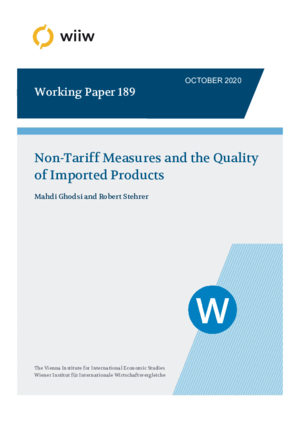Non-Tariff Measures and the Quality of Imported Products
Mahdi Ghodsi and Robert Stehrer
wiiw Working Paper No. 189, October 2020
32 pages including 12 Tables
Eight multilateral rounds of negotiations under the General Agreement on Tariffs and Trade (GATT) and international agreements under the World Trade Organisation (WTO) have contributed significantly to the reduction of tariffs among WTO members. However, over the years legitimate reasons for the imposition of non-tariff measures (NTMs) within regulations have triggered their extensive use. Among these measures, technical barriers to trade (TBTs) and sanitary and phytosanitary (SPS) measures allow countries to impose restrictions on the import of low-quality products suspected of harming domestic consumers’ health, plant life or the environment. Such trade policy instruments may lead to higher standards in the import market, in addition to improving market efficiency through information requirements such as mandatory labelling. This paper analyses two types of regulative and standard-like NTMs – TBTs and SPS measures – and the quality improvement of traded products that is driven by their imposition, which might be a general underlying motive for the adoption of such regulations. Based on a model framework involving both the supply and the demand side of trade and using four types of measures of these NTMs, this paper assesses the impact of TBTs and SPS measures on the quality of traded products. A dummy variable measuring the existence of these NTMs and a count variable indicating their stringency are used in the analysis. Moreover, two other variables indicate flows of NTMs imposed in each year and stocks of these NTMs accumulated over years. The results indicate that TBTs and SPS measures do indeed imply a higher quality of traded products, which is also consistent with the model when NTMs enter as a specific trade cost. Stringent TBTs with more regulations imposed in each year (i.e. flows of count TBTs) have the largest impact on the quality of traded products. However, for SPS measures only the existence of a regulation (i.e. the dummy variable on flows of SPS measures) on a traded product has the strongest impact on its quality.
Keywords: Non-tariff measures, technical barriers to trade, sanitary and phytosanitary measures, quality of products, global bilateral trade
JEL classification: F13, F14, L15
Countries covered: non specific
Research Areas: International Trade, Competitiveness and FDI
